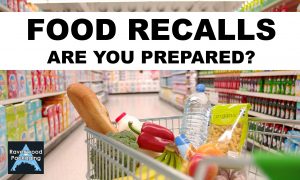Food product recalls are a major threat to food companies.
They result in disruption in operations while managing the recall, direct cost of recalling stock and the associated activities and the indirect costs caused by the knock-on effects, mainly reputational damage. This effect on consumers can result in significant long term financial losses for a company due to loss of sales.
Food recalls cost companies an average of $10 million in direct costs alone, according to a study by the Food Marketing Institute and the Grocery Manufacturers Association (GMA) in the US. A separate GMA sponsored a survey found 5% of companies incurred over $100m in direct and indirect costs.
The effect on consumers is possibly the most significant factor. A survey by Harris Interactive found that 15% of consumers would never buy that product again and 21% of people at a centre of a recall would not buy any product from the same manufacturer.
Product recalls are increasing
In both the US and the UK the numbers of products recalled have increased in the last few years. In a survey of companies, the GMA found that 58% of companies had been impacted by food recalls, with 6% having an impact from 11-20 recalls.
The factors that are driving an increase in food product recalls include:
- Just-in-time global manufacturing: products are increasingly sourced through global supply chains and contaminated products can rapidly spread worldwide before the problem is picked up.
- Fewer suppliers and complex supply chains: supply is concentrated in fewer global suppliers who source through complex supply chains. This increases risks in food safety and when one supplier has a problem it can affect many more retailers and consumers than in the past
- Improved technology and practices for traceability and detection of pathogens
- Stricter regulations and enforcement: the US, especially with the Food Safety Modernisation Act, and other countries have improved food safety legislation and enforcement recently
Causes of food product recalls
The most common cause of food product recalls is biological contamination (microorganisms and toxins), which mainly affects food supplied fresh or raw, such as nuts and vegetables. This type of contamination can have many causes, including use of contaminated water by a producer, personal hygiene and unsanitary food handling practices along the supply chain and pest infestations in the supply chain.
Allergenic products, such as nuts or dairy products, not declared on the label are a major cause of product recalls. These could be ingredients of the product or cross contamination from residues in the machinery from a previous production run that used allergenic ingredients.
Foreign matter is the second most common cause of food contamination in the UK and third in the US. This is a catchall for many different items, such as metal, plastic, glass, wood from production lines or packaging.
Costs of a food recall
The direct costs of a food recall include:
- Assembling the crisis team
- Removal of the product from the market, which includes:
- Issuing notifications to:
– Regulatory bodies
– Businesses affected in the supply chain
– Consumers - Collecting the product from warehouses, retailers and consumers
- Storage of the recalled product
- Destruction of the product
- Issuing notifications to:
- Investigation of the root cause of the factor that caused the recall
- Managing the PR to inform customers and protect the business reputation
Product recall insurers Lockton estimate that about 80% of the total costs are incurred long after the recall has been dealt with. This shows the importance of investing time and resources into PR to maintain brand reputation.
Prevent recalls
One of the major causes of food product recalls, as mentioned earlier, is contamination with pathogens such as Salmonella, Listeria and E.coli. This can occur at any stage in the food supply chain. The main way to prevent contamination is to implement hygienic practices to prevent cross contamination.
Foreign matter recalls can also be avoided by investing in an X-ray detection system, such as the Ravenwood VXR® system. The end of line solution provider can identify pieces of glass, metal, plastic, rubber and wood. When combining its three technologies, the key functionality of the VXR® system, is to identify and reject food trays that are seen to contain errors. Vision inspection and ‘Sapphire’ carbon nanotube field emission technology will resolve these issues. ‘Sapphire’ is a leading technology in the field of x-ray, boasting low energy, high speeds and resolution for unparalleled performance. Read more on the VXR® here>
According to Food Safety Magazine, a total of 44 foreign matter recalls were tallied in 2016. Foods affected by these recalls included everything from meat to fruit and even ice cream.
For further information, contact Marketing on +44 (0) 1284 749144.

